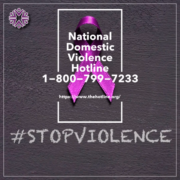Raise Your Domestic Violence Awareness
By Cody Randel
Domestic violence impacts millions of men and women every year. The more we know about identifying possible victims and offering support, the more individuals and families will get the help they deserve. Approximately one in four women and one in 10 men will experience domestic violence in their lives.
The Truth About Identifying Victims
The true nature of domestic violence makes it difficult to identify. Victims are often scared and shamed by their perpetrator, and they are hesitant to come forward. Knowing how to identify the signs of domestic violence could someday help save someone’s life.
- Physical signs such as bruises, cuts, or other marks on the victim’s body are a big indicator, these are often hidden with clothing or makeup, or by creating an untrue story of the origin of the injury.
- Emotional signs like fear, low self-esteem, timidity, depressed mood, substance abuse, isolation and others are important to notice.
There can be other signs, but in general, noticing some of the above are strong indicators, especially if behavior changes.
How You Can Help
Many people still view domestic violence as a private family matter, but it isn’t. It is a public health and social issue that impacts the safety of the community.
If you believe someone is experiencing domestic violence in a relationship, there are ways to help. How you approach helping is very important because it can mean the safety of everyone involved.
You can help by:
- providing emotional support for the victim by listening to and reassuring them that they do not deserve to be abused
- letting the victim know that you worry for their health and safety
- offering resources that can help them get out of the relationship
- NEVER confronting the perpetrator
- suggesting that the victim remove weapons from the home such as firearms, knives, etc.
- helping the victim create a Safety Plan (see more details below)
A Safety Plan should include:
- hidden bag packed with essentials like ID, money, car keys, etc. in case they have to leave quickly
- list of numbers for hospitals, shelters, hotlines, and other community resources
- a safe space for the victim (and possibly children) to go with other family, friends, or a shelter
If you see that a victim is in immediate danger, call 911. And if you are the victim of domestic abuse, there are resources and many professionals, like our team at NOAH, who can listen and provide resources to help.
Domestic violence resources:
- National Coalition Against Domestic Violence
- Futures Without Violence
- Office of Women’s Health
- Centers for Disease Control and Prevention – Intimate Partner Violence
- National Domestic Violence Hotline: 1-800-799-SAFE (1-800-799-7233)
- The National Sexual Assault Hotline: 1-800-656-4673
- The National Teen Dating Abuse Hotline: 1-866-331-9474






